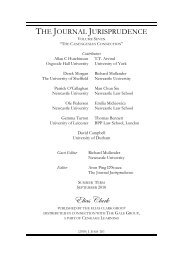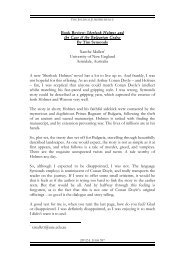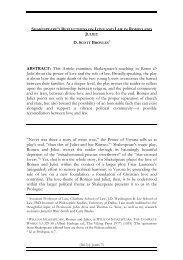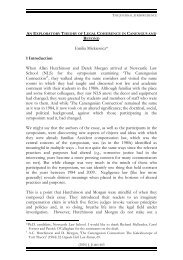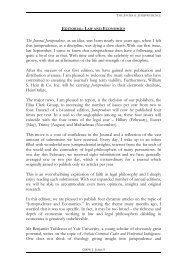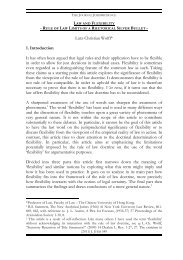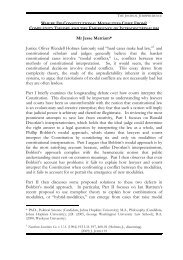On the Formation of the American Corporate State - The Journal ...
On the Formation of the American Corporate State - The Journal ...
On the Formation of the American Corporate State - The Journal ...
You also want an ePaper? Increase the reach of your titles
YUMPU automatically turns print PDFs into web optimized ePapers that Google loves.
SKOURAS ON THE FORMATION OF THE AMERICAN CORPORATE STATE:THE FULLER SUPREME COURT, 1888-1910Fur<strong>the</strong>r, <strong>the</strong> revisionists are mistaken in viewing America from <strong>the</strong> prism <strong>of</strong>liberal democracy. And although <strong>the</strong>se revisionists recognize that America isnot a class free country, <strong>the</strong>y seem to circumscribe economic primacy as a keycomponent <strong>of</strong> class structure. It has been taken for granted that America is anopen society with fluid class structure. <strong>The</strong>re are no fixed classes in America.However true this assertion seems to be, it should not be taken as unqualifiedlytrue. <strong>The</strong> philosophy <strong>of</strong> individualism, along with <strong>the</strong> consolidation <strong>of</strong>corporate power, has closed <strong>of</strong>f <strong>the</strong> upward movement for <strong>the</strong> majority <strong>of</strong><strong>American</strong>s from <strong>the</strong> start <strong>of</strong> <strong>American</strong> history.Given <strong>the</strong> Progressive interpretation <strong>of</strong> viewing <strong>the</strong> Fuller Court as probusinessand anti-labor, pro-capital power and limited government, can <strong>the</strong>serevisionists explain <strong>the</strong> Court’s behavior?a) <strong>The</strong> Neo-Federalist (liberal republican, dualist) syn<strong>the</strong>sis School---Bruce AckermanAckerman represents a School <strong>of</strong> neo-federalism, liberal republicanism 48 thatattempts to syn<strong>the</strong>size liberalism and republicanism, Locke and Machiavelli---he48 BRUCE ACKERMAN, 1WE THE PEOPLE: FOUNDATIONS (1991) and 2WE THE PEOPLE:TRANSFORMATIONS (1998); Ackerman drawing support for his Ne<strong>of</strong>ederalism <strong>the</strong>sis in: THEFEDERALIST PAPERS; GORDON WOOD, THE CREATION OF THE AMERICAN REPUBLIC 1776-1797 (1969); EDMUND S. MORGAN, INVENTING THE PEOPLE: THE RISE OF POPULARSOVEREIGNTY IN ENGLAND AND AMERICA (1988); HANNAH ARENDT, ON REVOLUTION(1963); BERNARD BAILYN, THE IDEOLOGICAL ORIGINS OF THE AMERICAN REVOLUTION(1967); J.G.A. POCOCK, THE MACHIAVELLIAN MOMENT: THE FLORENTINE POLITICALTHOUGHT AND THE ATLANTIC REPUBLICAN TRADITION (1975); Frank Michelman, Law’sRepublic, 97 YALE L.J 1493 (1988); Cass Sunstein, Beyond <strong>the</strong> Republican Revival, 97 YALE L.J 1539(1988) and THE PARTIAL CONSTITUTION (1993); Suzanna Sherry, Responsible Republicanism:Educating for Citizenship, 62 U. CHI. L. REV. 131 (1995); critics <strong>of</strong> Ackerman work include:Michael Les Benedict, History and Constitutional <strong>The</strong>ory: Reflections on Ackerman, Reconstruction, and<strong>the</strong> Transformation <strong>of</strong> <strong>the</strong> <strong>American</strong> Constitution, 108 YALE L.J 2011 (1999) and Laissez-faire andLiberty: A Reevaluation <strong>of</strong> <strong>the</strong> Meaning and Origin <strong>of</strong> Laissez-Faire Constitutionalism, 3 LAW & HISTORYREV. 243-331 (1985); Miriam Galston and William A. Galston. Reason, Consent, and <strong>the</strong> U.S.Constitution: Bruce Ackerman's "We <strong>the</strong> People", 104 ETHICS 446 (1994); Thomas Landry,Ackermania!: Who Are We <strong>the</strong> People?, 47 U. MIAMI L. REV. 267 (1992); William Fisher, <strong>The</strong> Defects<strong>of</strong> Dualism, U. CHI. L. REV. 955 (1992); Michael Klarman, Constitutional Fact/Constitutional Fiction:A Critique <strong>of</strong> Bruce Ackerman’s <strong>The</strong>ory <strong>of</strong> Constitutional Moments, 44 STAN. L. REV. 759 (1992); EbenMoglen, <strong>The</strong> Incomplete Burkean: Bruce Ackerman’s Foundation for Constitutional History, 5 YALE J.L.& HUMAN. 531 (1993); Randy E. Barnett, Constitutional Legitimacy, 103 COLUM. L. REV. 111(2003); David E. Bernstein, Lochner Era Revisionism, Revised: Lochner and <strong>the</strong> Origins <strong>of</strong> FundamentalRights Constitutionalism, 82 GEO. MASON L. REV. 1 (2003); o<strong>the</strong>r scholars questioning <strong>the</strong> ne<strong>of</strong>ederalistapproach: Ahkil Reed Amar, A Few Thoughts on Constitutionalism, Textualism, andPopulism, 65 FORDHAM L. REV. 1657 (1997), <strong>The</strong> Bill <strong>of</strong> Rights as a Constitution, 100 YALE L.J.(2011) J. JURIS 48



